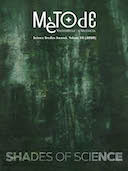Race and soil: Geography, ethnology, and Nazism
DOI:
https://doi.org/10.7203/metode.10.13560Keywords:
ethnography, Nazism, colonialism, Franz Termer, Guatemala Abstract
Abstract
For decades, Franz Termer (1894–1968) was professor of ethnology at the University of Hamburg. His area of research was Central America. Between 1935 and 1962 he was also the director of the Museum of Ethnology in Hamburg. His academic career coincided with one of the most decisive periods in German history: National Socialism. He was a founding member of the famous journal Zeitschrift fu?r Geopolitik and admired Friedrich Ratzel and his «political geography». The concept of «blood and soil» as a historical determinant could be found in Termer’s work ten years before the Nazis used it as their state’s official ideology. After the fall of Nazism, he declared himself an «adversary» and «victim» of that policy. However, a careful reading of his texts reveals that he had supported National Socialism, colonialism, anti-Semitism, and racism for five decades.
 Downloads
Downloads
 References
References
Bierhenke, W., Haberland, W., Johansen, U., & Zimmerman, G. (1959). Amerikanistische Miszellen. Festband Franz Termer. Mitteilungen aus dem Museum für Völkerkunde in Hamburg, 25.
Fischer, H. (1990). Völkerkunde im Nationalsozialismus. Berlin: Reimer.
Gall, F. (1969). Franz Termer: in Memoriam. Anales de la Sociedad de Geografía e Historia de Guatemala, 42, 36–45.
Haberland, W. (1964). Bibliographie der Arbeiten von Franz Termer aus den Jahren 1919-1964. Hamburg: W. Haberland. Retrieved from https://dialnet.unirioja.es/descarga/articulo/4008992.pdf
Karlowa, R. (1939). Deutsche Kolonialpolitik. Breslavia: Hirt.
Köhler, P. (1925). Rezension Zeitschrift für Geopolitik. Vierteljahrschrift für Sozial- und Wirtschaftsgeschichte, 18(3/4), 447–448.
Krause, E., Huber, L., & Fischer, H. (1991). Hochschulalltag im «Dritten Reich». Die Hamburger Universität 1933-1945. Berlin: Dietrich Reimer.
Lütgens, R. (1925). Rezension Zeitschrift für Geopolitik. Weltwirtschaftliches Archiv, 21(1), 23–24.
Ratzel, F. (1897). Politische Geographie. Munich: R. Oldenbourg.
Ratzel, F. (1901). Der Lebensraum: Eine biogeographische Studie. In A. Bücher et al., Festgaben für Albert Schäffle, (pp. 101–189). Tübingen: H. Laupp.
Ratzel, F. (1940). Erdenmacht und Völkerschicksal. Stuttgart: Kröner.
Sapper, K. (1939). Deutsche als Kolonialpioniere in den Tropen. Zeitschrift für Politik, 29, 39–52.
Sieger, R. (1923). Politische Geographie. In P. Herré, & K. Jagow (Eds.), Politisches Handwörterbuch, (p. 331). Leipzig: Koehler.
Termer, F. (1938, 26 October). Letter to Nora Termer. Hamburg: Museum für Völkerkunde.
Termer, F. (1939, 4 February). Letter to M. Planck. Hamburg: Museum für Völkerkunde.
Termer, F. (1941a). Zur Geographie der Republik Guatemala. Beiträge zur Kultur und Wirtschaftsgeographie von Mittel und Südguatemala. (2. Teil). Mitteilungen der Geographischen Gesellschaft in Hamburg, 47, 11–262.
Termer, F. (1941b, 4 January). Farbige und Weiße in Amerika. Hamburger Tageblatt, p. 8.
Termer, F. (1941c). Erhaltende und zersetzende Kräfte im Volkstum der Maya-Indianer von Guatemala. Koloniale Rundschau, 32, 214–235.
Termer, F. (1941d, 3 February). Letter to K. Sapper. Hamburg: Museum für Völkerkunde.
Termer, F. (1942). Europäische Kultureinflüsse in Iberoamerika. Europäischer Wissenschaftsdienst. Korrespondenz für Kultur und Wissenschaft, 2(14), 8–9.
Termer, F. (1950). Über Eingeborenenreservate in Amerika. In I. Tönnies, Beiträge zur Gesellungs-und Völkerwissenschaft Berlin, (pp. 325–332).
Termer, F. (1957). Etnología y etnografía de Guatemala. Guatemala: Editorial del Ministerio de Educación Pública.
Uexküll, J. V. (1920). Staatsbiologie: Anatomie, Physiologie, Pathologie des Staates. Berlin: Gebrüder Paetel.
Wittfogel, K. A. (1970). Geopolitik, geographischer Materialismus und Marxismus 1-3. In K. A. Wittfogel, Marxismus und Wirtschaftsgeschichte. Frankfurt: Junius Drucke. (Original work published in 1929).
Downloads
Published
How to Cite
-
Abstract1527
-
PDF729
Issue
Section
License
![]()
All the documents in the OJS platform are open access and property of their respective authors.
Authors publishing in the journal agree to the following terms:
- Authors keep the rights and guarantee Metode Science Studies Journal the right to be the first publication of the document, licensed under a Creative Commons Attribution-NonCommercial-NoDerivatives 4.0 International License that allows others to share the work with an acknowledgement of authorship and publication in the journal.
- Authors are allowed and encouraged to spread their work through electronic means using personal or institutional websites (institutional open archives, personal websites or professional and academic networks profiles) once the text has been published.





